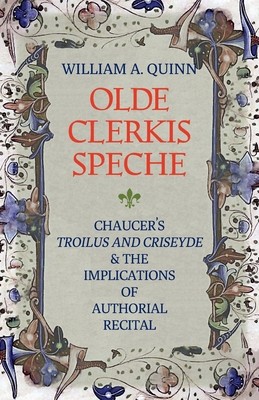
- We will send in 10–14 business days.
- Author: William A Quinn
- Publisher: Catholic University of America Press
- ISBN-10: 0813235685
- ISBN-13: 9780813235684
- Format: 14 x 21.6 x 1.5 cm, minkšti viršeliai
- Language: English
- SAVE -10% with code: EXTRA
Reviews
Description
Olde Clerkis Speche affirms both the historical legitimacy and the interpretive benefits of reading Troilus and Criseyde as if the text were initially composed for Chaucer's own recital before a familiar audience. Proposing a qualification rather than contradiction of the "persona" as a reading premise, Quinn revitalizes the interpretive context of Chaucer's original performance milieu. The central five chapters offer a "close hearing" of the possible tonal strategies of each book of Troilus and Criseyde during actual recital. Particular attention is given to expressions now normally overlooked, phrasing that does not advance the modern reader's appreciation of plot or character development or theme; such "filler" did, however, once offer Chaucer's own "reader response" (or ennaratio) during the recital event. These five chapters simultaneously evaluate the probability that Chaucer himself revised each recital installment for subsequent manuscript circulation. All together, these chapters provide a sustained case study of the interplay between the author's anticipations of recital presence and textual absence.
Although this study does not pretend to detail an inaugural staging of Troilus and Criseyde, it does attend to the histrionic potential of Chaucer's own "speche/ In poetrie" (T&C V. 1854-5). The final chapter discusses how such a recital premise impacts several current controversies among Chaucerians, including the dating of Chaucer's individual acts of composition, the underlying assumptions regarding the "publication" of each text, the editorial imposition of punctuation on the manuscript record, and the poet's increasing anxiety regarding his future absence from the reading event. Olde Clerkis Speche will be of interest to all readers of Chaucer as well as everyone interested in performance theory and the history of reading.
EXTRA 10 % discount with code: EXTRA
The promotion ends in 21d.08:46:11
The discount code is valid when purchasing from 10 €. Discounts do not stack.
- Author: William A Quinn
- Publisher: Catholic University of America Press
- ISBN-10: 0813235685
- ISBN-13: 9780813235684
- Format: 14 x 21.6 x 1.5 cm, minkšti viršeliai
- Language: English English
Olde Clerkis Speche affirms both the historical legitimacy and the interpretive benefits of reading Troilus and Criseyde as if the text were initially composed for Chaucer's own recital before a familiar audience. Proposing a qualification rather than contradiction of the "persona" as a reading premise, Quinn revitalizes the interpretive context of Chaucer's original performance milieu. The central five chapters offer a "close hearing" of the possible tonal strategies of each book of Troilus and Criseyde during actual recital. Particular attention is given to expressions now normally overlooked, phrasing that does not advance the modern reader's appreciation of plot or character development or theme; such "filler" did, however, once offer Chaucer's own "reader response" (or ennaratio) during the recital event. These five chapters simultaneously evaluate the probability that Chaucer himself revised each recital installment for subsequent manuscript circulation. All together, these chapters provide a sustained case study of the interplay between the author's anticipations of recital presence and textual absence.
Although this study does not pretend to detail an inaugural staging of Troilus and Criseyde, it does attend to the histrionic potential of Chaucer's own "speche/ In poetrie" (T&C V. 1854-5). The final chapter discusses how such a recital premise impacts several current controversies among Chaucerians, including the dating of Chaucer's individual acts of composition, the underlying assumptions regarding the "publication" of each text, the editorial imposition of punctuation on the manuscript record, and the poet's increasing anxiety regarding his future absence from the reading event. Olde Clerkis Speche will be of interest to all readers of Chaucer as well as everyone interested in performance theory and the history of reading.


Reviews